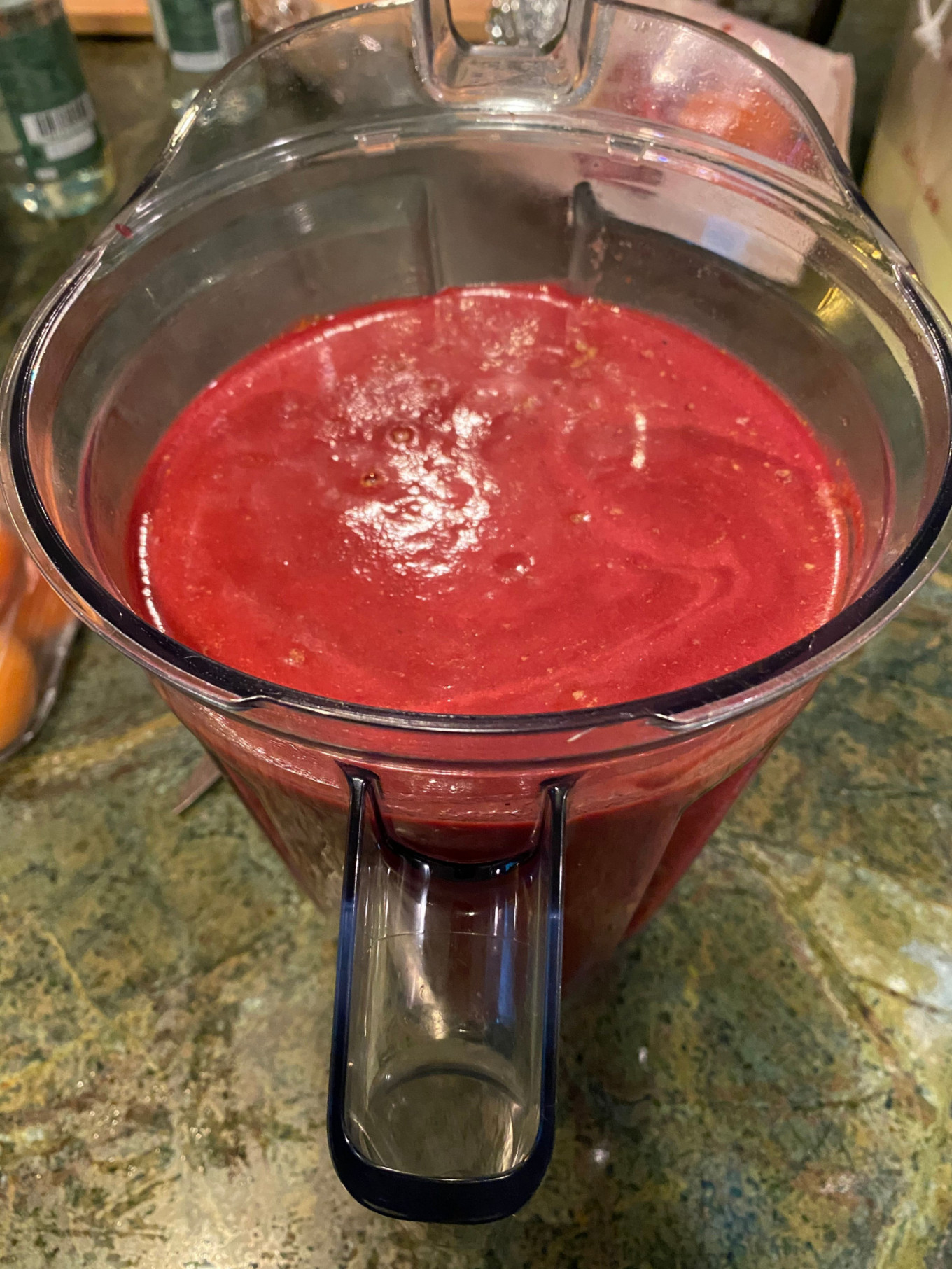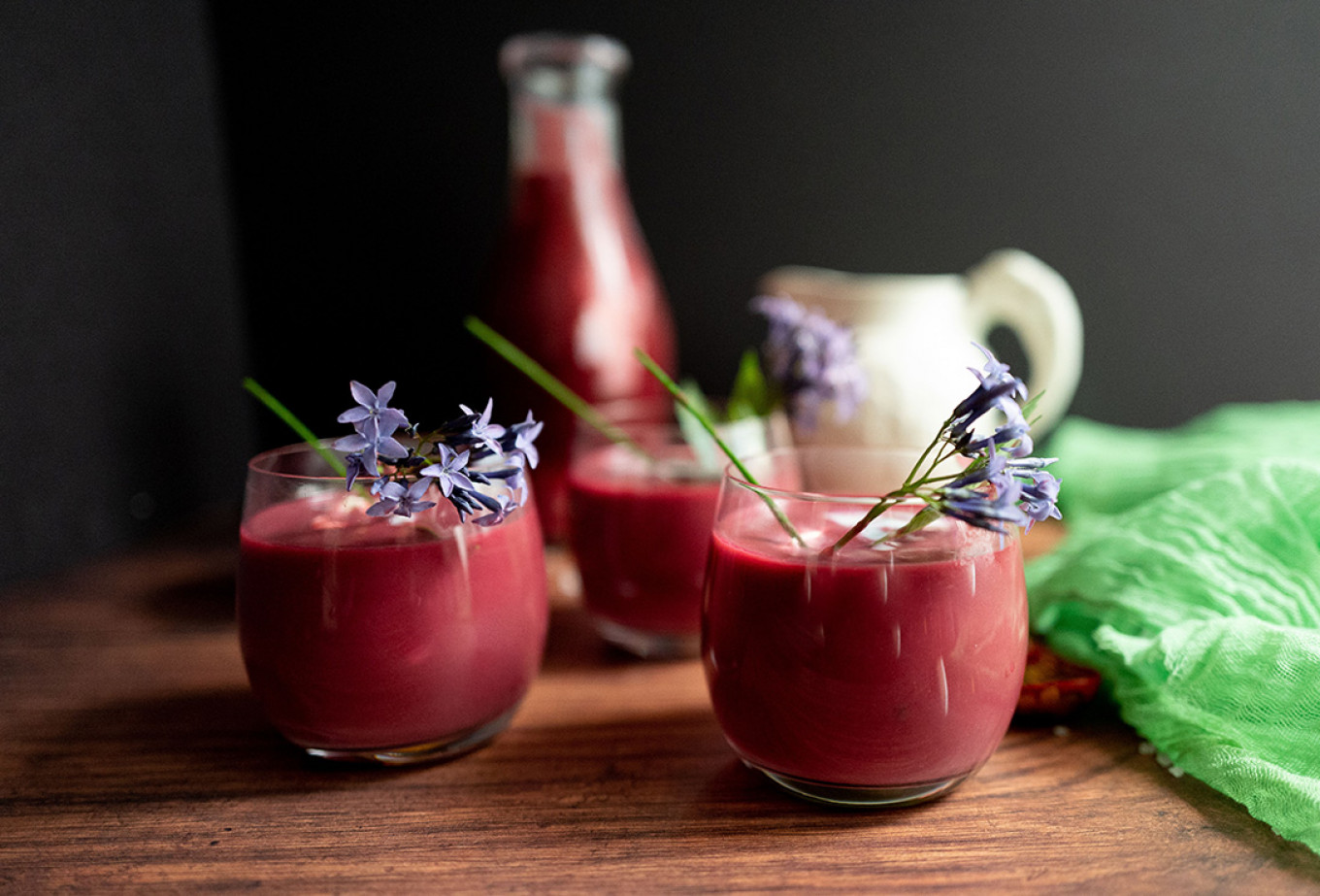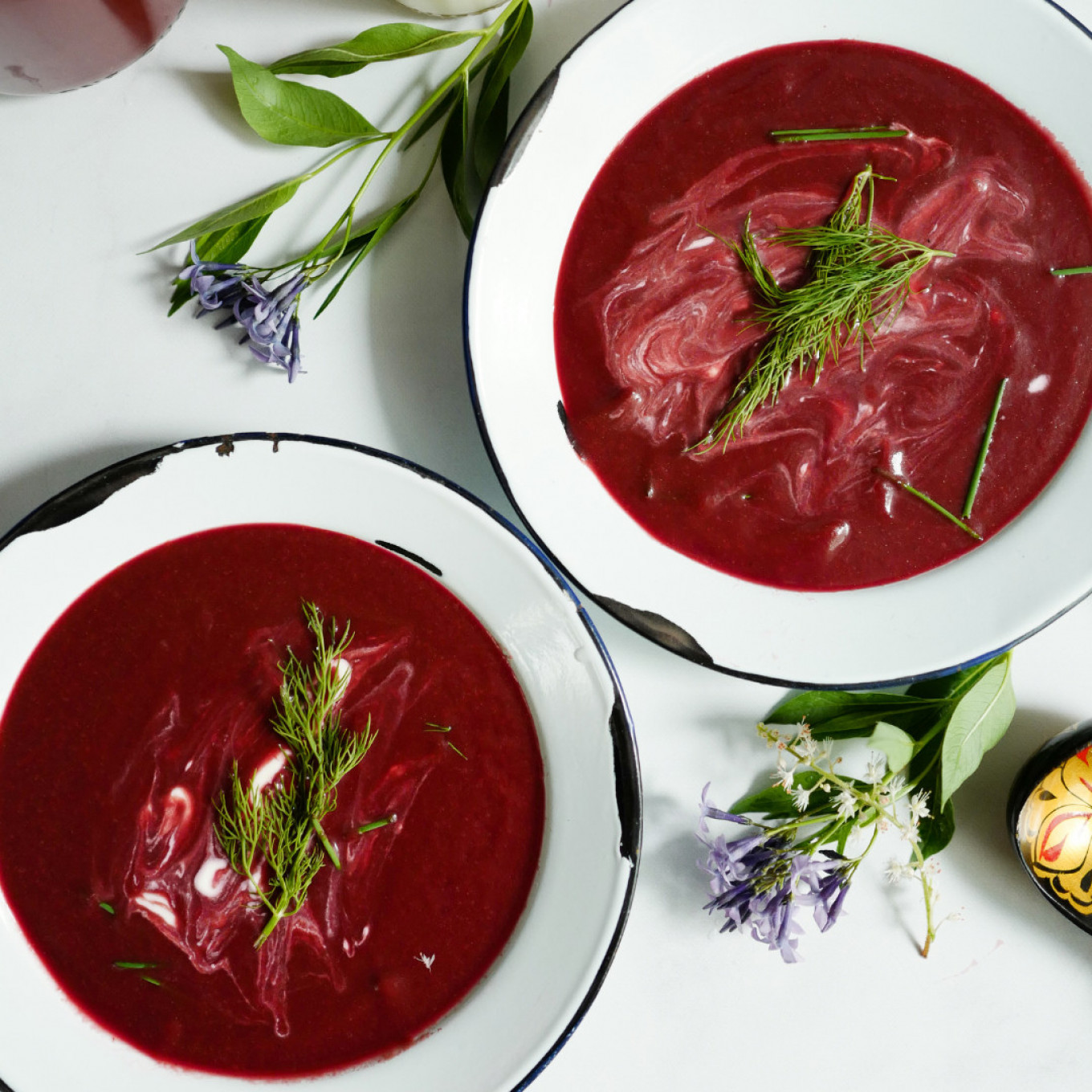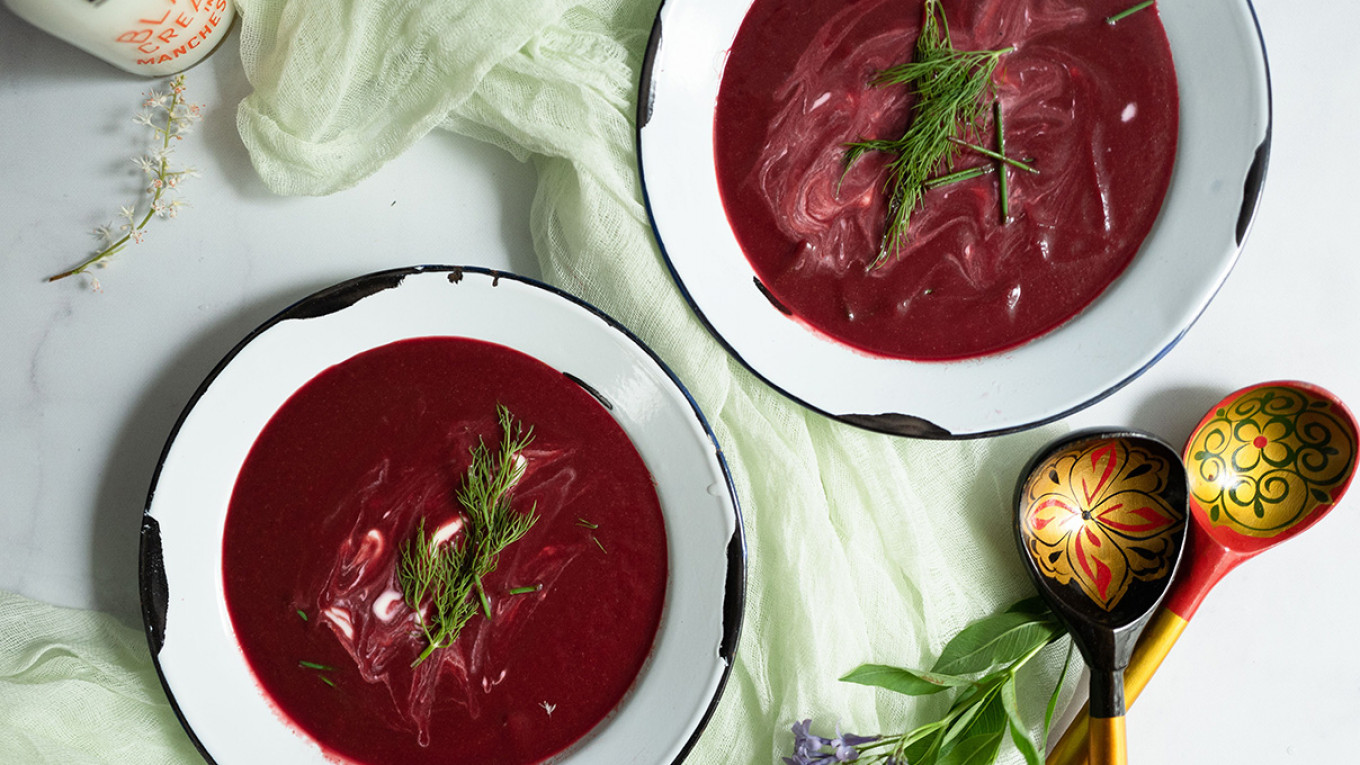And just like that — it’s summer.
It caught me unawares. I haven’t put my winter clothes away and I still reach for socks in the morning. Until the hot weather began in earnest this week, I was still firmly in hot soup mode, so much so that I lugged home from the market a large basket of lovely beets and wild garlic with the full intention of making a large vat of classic borshch. But in the space of one day, the weather went from cloudy and chilly to hot, sunny, and humid and the very thought hot soup became anathema.
The good news is that if you haven’t started, it is but the work of a minute to pivot from hot borshch to a cold soup version called svekolnik (cвекольник), which uses some of the same ingredients — but, note carefully, not all of them!
Each Eastern European country claims a version of svekolnik: Lithuanians call it Šaltibarščiai; Belorussians, khaladnik; Latvians call it “aukstā zupa,” and the Poles, “cholodnik.” Though each version is beet based, but after that, it is up to the individual cook to decide which ingredients to include and which texture to create: some versions are laden with diced potatoes, hard-boiled eggs, and chunks of smoked meat, while others are delicate, primarily liquid things, with only the occasional thinly sliced radish or cucumber cube bobbing about at the surface, while still others are made vibrant pink with the addition of sour cream, kefir, or buttermilk.
There are very few rules for svekolnik, except this one: svekolnik is not hot borshch that you simply haven’t heated. If you’ve ever tried classic borshch right from the fridge, you’ll know that this is madness. Borshch at its best relies on that old Eastern European principle that fat is flavor. When hot, a well-larded borshch shimmers with a thin but redolent veneer of fat, the natural result of a slow braise in stock and root vegetables. Delicious. But cold fat congeals into unappetizing fleshy polyps that would deter even the most fervent borshch fantastic. So too, the sour elements of hot borshch — fermented or pickled vegetables — are transformed by heat but often can be too intense, too salty, or too sour when cold.
And yet, it is important to keep the sour tang of borshch that so perfectly complements the deep sweetness of roasted beets. My solution is pomegranate juice — the perfect mouth-puckering compliment, which has the added advantage of being in the ideal color palette to deepen the vibrant pinky-purple of svekolnik. Blackberry jam is another non-traditional ingredient, but provides a hint of sweetness that pulls the whole things together. I like my svekolnik without meat but if you can’t imagine it vegetarian, add in some finely diced smoked ham at the end rather than braising the meat with the vegetables.
No Eastern European would consider borshch complete without a dollop of dairy, be it sour cream or crème fraiche. And most would advocate the same treatment for svekolnik. I agree, but my choice of dairy is buttermilk or kefir, which keeps the soup on the light side, amplifies its tang, and adds a bit of fizz into the mix.

I like to puree my svekolnik, which is not everyone’s choice, but I like the smooth texture, like that of a milkshake, and I find it makes a beautiful and simple appetizer, when served in frosted low-ball glasses. It’s cool, refreshing, and the ideal beginning of a summer picnic or barbecue.
Although it can cause confusion.
“What is this, a smoozie?” is usually the question I get from some Russian guy whose face is almost the color of svekolnik, after a few too many shots while the grill heats up.
I simply smile and continue to pass around trays filled with my vibrant pinky purple svekolnik spiked with fresh mint and dill. My answer is always the same.
“That’s right! Have a svekolnik smoothie!

Svekolnik
Ingredients
- 3 large beets with their stems and greens
- 1 Tbsp olive oil
- 2 stalks of wild garlic or 3 cloves of garlic and the green parts of a bunch of scallions
- 2 medium carrots, peeled and sliced
- 1 Tbsp prepared horseradish
- 1 tsp crushed calendula leaves
- 2 tsp coriander seeds
- 2 tsp dill seed
- 2 tsp caraway seed
- 2 tsp salt
- Several generous grinds of fresh black pepper
- 2 cups pomegranate juice
- 4 cups water
- 2 Tbsp blackberry jam
- ¼ cup fresh dill
- ¼ cup fresh coriander (cilantro)
- ¼ cup fresh parsley
- 4 cups buttermilk or kefir, well chilled and shaken
- Sour cream for garnish
Instructions
- Preheat the oven to 450ºF (220ºC).
- Toast the coriander, caraway, and dill seeds in a skillet until their fragrance intensifies. Crush them with a mortar and pestle, then set aside.
- Trim the beets, setting the stems and leaves aside. Wrap the beets in a tin foil pouch and roast for 30-40 minutes until the tip of a sharp knife slides in easily. Roasting time will depend on the size of the beets. Set the beets aside to cool to room temperature. Wash the beet greens thoroughly and dry them in a salad spinner. Slice the beet stems.
- Peel the cloves of wild garlic and chop with the stems. Heat the olive oil in a large soup pot. Sauté the wild garlic before adding the carrots and the beet stems, for an additional 5 minutes. Add the horseradish, toasted spices, water, pomegranate juice, and blackberry jam and bring to a gentle simmer. Add the beet greens, then cover and simmer for 40 minutes.
- Allow the soup to cool to room temperature, then add half of the chopped fresh herbs, keeping back the other half for a garnish. Puree the soup in a blender, if you wish, or leave it as is. Chill the soup for 2 hours. Give the buttermilk or kefir a good shake before swirling it into the chilled soup. Garnish with the remaining herbs and a dollop of sour cream.
- Serve well chilled.
- 8-10 servings.

A Message from The Moscow Times:
Dear readers,
We are facing unprecedented challenges. Russia's Prosecutor General's Office has designated The Moscow Times as an "undesirable" organization, criminalizing our work and putting our staff at risk of prosecution. This follows our earlier unjust labeling as a "foreign agent."
These actions are direct attempts to silence independent journalism in Russia. The authorities claim our work "discredits the decisions of the Russian leadership." We see things differently: we strive to provide accurate, unbiased reporting on Russia.
We, the journalists of The Moscow Times, refuse to be silenced. But to continue our work, we need your help.
Your support, no matter how small, makes a world of difference. If you can, please support us monthly starting from just $2. It's quick to set up, and every contribution makes a significant impact.
By supporting The Moscow Times, you're defending open, independent journalism in the face of repression. Thank you for standing with us.
Remind me later.







